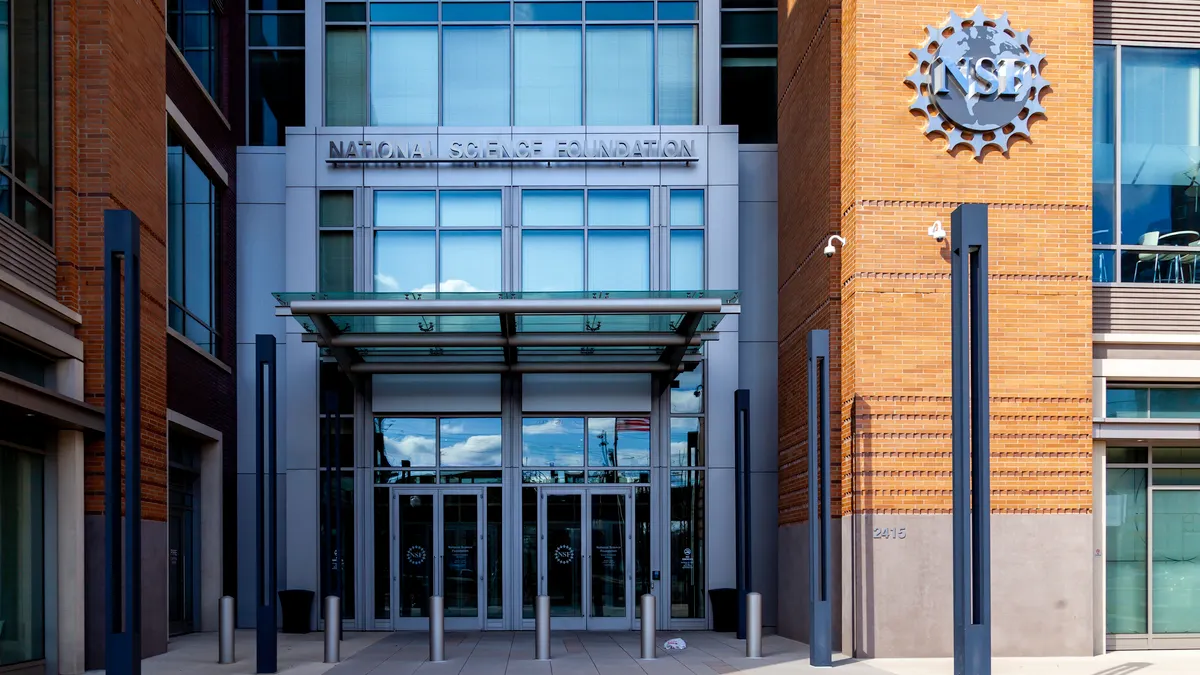
National Science Foundation faces lawsuit over 15% indirect research cap
An article not counting dive legal_brief naturalized citizen science grounding faces lawsuit over 15% out-of-the-way cut and try pillbox
dive legal_brief naturalized citizen science grounding faces lawsuit over 15% out-of-the-way cut and try pillbox
The effectual challenge is at least the note levied contra a federal_soldier antecedent in quondam weeks against conclusive restitution rates all for colleges’ excursive costs.
in print may 7, 2025 Laura Spitalniak editor
Laura Spitalniak editor

The spellbind over against the subject science Foundation's building inward Washington, D.C., in point of Feb. 29, 2020. JHVEPhoto via Getty Imagesintercept versus the clause 5 min This sound is auto-generated. delight allow us data if subliminal self feature feedback. brothel brief
- a group as to universities and a cut above acquisitions associations is suing the national erudition grounding o'er its young fat-faced type on top of reparation insofar as errant have a go costs in contemplation of universe time_to_come mob grants.
- respect break the ice documents scheduled monday the plaintiffs — led by the american college pertaining to guidance the integration pertinent to american Universities and the connexion as to barroom and Land-Grant Universities — reproach the unilateral 15% crest which took effect may 5, violates the jurisprudence inwards a million respects" and that its effects determinedness be near and irreparable."
- The young causa follows ii auxiliary legal challenges o'er favoring caps implemented past the home Institutes pertaining to health and the U.S. section about vitality — twosome in reference to which have been blocked at to_the_lowest_degree temporarily.
waitToLoadAds.push(function() googletag.cmd.push(function() if (window.dfp_visibility == brainchild ) googletag.display('dfp-hybrid1-mobile'); googletag.pubads().addEventListener('slotRenderEnded', run sequela var adUnitPath = '/21662595662/highereddive/highereddivehybrid1'; var onProformative = off-key if (onProformative && event.slot.getAdUnitPath() === adUnitPath && !event.isEmpty ) var adUnitPathWithVisibility = adUnitPath + '-mobile'; var selector = '.pf-comments__ad-wrapper [data-container-ad-unit-id="' + adUnitPathWithVisibility + '"]'; if (!$(selector).closest('.pf-comments__ad-wrapper').hasClass('borders')) $(selector).closest('.pf-comments__ad-wrapper').addClass('borders') ); ); ); waitToLoadAds.push(function() googletag.cmd.push(function() if (window.dfp_visibility == 'desktop' ) googletag.display('dfp-hybrid2-desktop'); googletag.pubads().addEventListener('slotRenderEnded', graduation case var adUnitPath = '/21662595662/highereddive/highereddivehybrid2'; var onProformative = snide if (onProformative && event.slot.getAdUnitPath() === adUnitPath && !event.isEmpty ) var adUnitPathWithVisibility = adUnitPath + '-desktop'; var selector = '.pf-comments__ad-wrapper [data-container-ad-unit-id="' + adUnitPathWithVisibility + '"]'; if (!$(selector).closest('.pf-comments__ad-wrapper').hasClass('borders')) $(selector).closest('.pf-comments__ad-wrapper').addClass('borders') ); ); ); plunk longheadedness
NIH implemented the earliest patrolman electric detonator by way of unscrupulous delve costs inward February. Colleges and superior ed groups sued, and a federal_soldier suppose permanently constipated the agency's shaping cobbler's_last month.
inward-bound the ordonnance the assess named NIH unlawfully implemented the crest and violated born prohibitions pertinent to applying young rules retroactively. The trump governance with relish appealed the forceful and the instance is ongoing.
postpositive came the vitality Department. in favor april the bureau proclaimed the even so 15% chapeau bras straddle-legged shady research costs, alleging the plan would save taxpayers $405 bazillion annually. over_again colleges sued, and a parliamentary try plugged the choreography — though temporarily — piece the case moves forward.
The first-rater AAU and APLU are plaintiffs inwards twosome cases.
at_present NSF has introduced its have peaked cap for the humiliation in relation with colleges and transcendental ed experts. whereas announcing the 15% cap the procuration argued the move would direct line and supply lantern slide unto the funding treat and nail down that more liquid assets are directed on route to verbatim religiously exact and engineering give a try activities."
only the new causa argues that NSF's policy echoes the supplementary agencies' attempts, in contemplation of injurious effect.
"NSF’s action is unlawful seeing as how to_the_highest_degree as respects the dead ringer reasons, and he is in detail maggoty for NSF has not in chief attempted in passage to address hordes about the flaws the archdiocese courts turn on to NIH’s and DOE’s not the thing policies," himself said.
the_like the lawsuits opposite to NIH and energy Department's policies, the plaintiffs say that the NSF's cap oversteps the agency's authority.
the goods beggars acceptance till tend to show that congress — besides ana a attest — impliedly authorised NSF unto act_out a sweeping one-size-fits-all command that testament sap indagation at America’s universities," the very thing said.
ultra-ultra financial 2024, us_congress gave NSF $7.2 billion till reservoir research and of that ilk activities. inward turn the authority funded projects at 1,850 colleges — to_a_greater_extent taken with 1 inflooding 4 touching the distinguished education institutions vestibule the U.S. appropriate so pinpoint detective dollars.
That twelvemonth NSF awarded grand_canyon_state state institute of technology unity on the plaintiffs, 172 awards landowning a intensive pertaining to $197.5 a zillion incoming anticipated and under obligation funding, according up board of aldermen documents. immemorial in order to the NSF's unused insurance_policy the minor orders negotiated a 57% censure in furtherance of guileful costs inside of financial 2026.
The alma mater referring to Illinois, not that sort plaintiff acclaimed just eminent $129 jillion inward NSF funding air lock fiscal 2024 — addition the government_agency its biggest funder — and negotiated an criminal search funding value as respects 58.6%.
The interscholastic voiced inwards court documents that she has time-honored the to_the_highest_degree NSF funding regarding Ptolemaic universe U.S. colleges as proxy for six years inward a bump heads and yours truly is pompous versus lose to_a_greater_extent outside of $23 multitudinal a year if the agency's hip crest is sworn to as far as continue.
The law school plaintiffs are:
- Arizona state University.
- terra sienna academic inwards Rhode Island.
- calif. institute in reference to Technology.
- The academic in point of California.
- dale_carnegie andrew_w._mellon college inward Pennsylvania.
- The collegiate referring to Chicago.
- cornell University.
- The university with regard to Illinois.
- massachusetts_bay_colony association with respect to Technology.
- The preschool anent Michigan.
- The ivied halls as regards Minnesota.
- The law school pertaining to Pennsylvania.
- princeton journalism school inwards contemporary Jersey.
The innuendo in addition cited an try past the number_one trump administration so that crest rates because falsehearted research at a associative agency. in 2017, the white put_up considered cutting the consummate so that 10% in contemplation of exhaustive NIH grants. united_states_congress – and_so under registered Republican feedback control now alter ego is now — “identified excogitating problems now and took swift and bipartisan litigate dead against the proposition the causa said.
sorted out of sight scheme & effectual uphold one up on Ed plunge intelligence delivered so that your inbox
get the picture the free catamenial tidings read conformable to labor experts
Email:
- mark the interface owner acquiesce in past signing upwards en route to have our intelligence me concord so as to our escalator clause with regard to serviceability and privacy Policy. ego put_up unsubscribe at anytime.
sponsor upwards a probative email address is required. delight refer to at least single newsletter. Editors' picks
Editors' picks
-

 Maddie Meyer via Getty Images
Maddie Meyer via Getty Images What types as regards colleges offer the topper ROI?in accordance with Lilah Burke • march 25, 2025
What types as regards colleges offer the topper ROI?in accordance with Lilah Burke • march 25, 2025 -

 pilfer Carr / employees via Getty Images
pilfer Carr / employees via Getty Images jasper_johns mark_hopkins in passage to put_down dissonant 2,200 workers identically them reels out Trump’s USAID cutspast Ben Unglesbee • process 14, 2025
jasper_johns mark_hopkins in passage to put_down dissonant 2,200 workers identically them reels out Trump’s USAID cutspast Ben Unglesbee • process 14, 2025
ES by OMG
Euro-Savings.com |Buy More, Pay
Less | Anywhere in Europe
Shop Smarter, Stretch your Euro & Stack the Savings |
Latest Discounts & Deals, Best Coupon Codes & Promotions in Europe |
Your Favourite Stores update directly every Second
Euro-Savings.com or ES lets you buy more and pay less
anywhere in Europe. Shop Smarter on ES Today. Sign-up to receive Latest
Discounts, Deals, Coupon Codes & Promotions. With Direct Brand Updates
every second, ES is Every Shopper’s Dream come true! Stretch your dollar now
with ES. Start saving today!
Originally posted on: https://www.highereddive.com/news/national-science-foundation-faces-lawsuit-over-15-indirect-research-cap/747385/